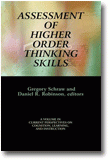
Assessment of Higher Order Thinking Skills
Edited by:
Gregory Schraw, University of Nevada - Las Vegas
Daniel H. Robinson, University of Texas at Arlington
A volume in the series: Current Perspectives on Cognition, Learning and Instruction. Editor(s): Daniel H. Robinson, University of Texas at Arlington. Marlynn M. Griffin, Georgia Southern University.
Published 2011
This volume examines the assessment of higher order thinking skills from the perspectives of applied cognitive psychology and measurement theory. The volume considers a variety of higher order thinking skills, including problem solving, critical thinking, argumentation, decision making, creativity, metacognition, and self-regulation.
Fourteen chapters by experts in learning and measurement comprise four sections which address conceptual approaches to understanding higher order thinking skills, cognitively oriented assessment models, thinking in the content domains, and practical assessment issues. The volume discusses models of thinking skills, as well as applied issues related to the construction, validation, administration and scoring of perfomancebased, selected-response, and constructed-response assessments.
The goal of the volume is to promote a better theoretical understanding of higher order thinking in order to facilitate instruction and assessment of those skills among students in all K-12 content domains, as well as professional licensure and cetification settings.
CONTENTS
Conceptualizing and Assessing Higher Order Thinking Skills, Gregory Schraw and Daniel H. Robinson. PART I: CONCEPTUAL APPROACHES TO UNDERSTANDING HIGHER ORDER THINKING SKILLS. An Overview of Thinking Skills, Gregory Schraw, Matthew T. McCrudden, Stephen Lehman, and Bobby Hoffman. Higher Order Thinking and Knowledge: Domain-General and Domain-Specific Trends and Future Directions, Patricia A. Alexander, Daniel L. Dinsmore, Emily Fox Emily M. Grossnickle, Sandra M. Loughlin, Liliana Maggioni, Meghan M. Parkinson, and Fielding I. Winters. Designing Assessments of Self-Regulated Learning, Philip H. Winne, Mingming Zhou, and Rylan Egan. PART II: COGNITIVE ASSESSMENT MODELS. Test Design With Higher Order Cognition in Mind, Joanna S. Gorin and Dubravka Svetina. A Cognitive Model for the Assessment of Higher Order Thinking in Students, Jacqueline P. Leighton. PART III: HIGHER ORDER THINKING IN CONTENT DOMAINS. The Assessment of Higher Order Thinking in Reading, Peter Afflerbach, Byeong-Young Cho, and Jong-Yun Kim. Assessing Learning From Inquiry Science Instruction, Stephanie B. Corliss and Marcia C. Linn. Assessment of Higher Order Thinking: the Case of Historical Thinking, Kadriye Ercikan and Peter Seixas. PART IV: PRACTICAL ISSUES IN THE ASSESSMENT OF HIGHER ORDER THINKING SKILLS. Issues in the Design and Scoring of Performance Assessments That Assess Complex Thinking Skills, Suzanne Lane. Incorporating Cognitive Demand in Credentialing Examinations, Susan L. Davis and Chad W. Buckendahl. Strategies for Constructing Assessments of Higher Order Thinking Skill, Susan M. Brookhart and Anthony J. Nitko. Critical Thinking in the Classroom: Teachers’ Beliefs and Practices in Instruction and Assessment, Bruce Torff. Aligned by Design: A Process for Systematic Alignment of Assessments to Educational Domains, William D. Schafer. About the Authors.
-
Paperback978-1-61735-505-9
Web price: $62.04 (Reg. 72.99)
-
Hardcover978-1-61735-506-6
Web price: $89.24 (Reg. 104.99)
- eBook9781617355073

- EDU009000 - EDUCATION: Educational Psychology
- EDU015000 - EDUCATION: Higher
- EDU037000 - EDUCATION: Research
-
 Learning Through Visual Displays
Learning Through Visual Displays
-
 Misinformation and Fake News in Education
Misinformation and Fake News in Education
-
 Recent Innovations in Educational Technology that Facilitate Student Learning
Recent Innovations in Educational Technology that Facilitate Student Learning
-
 Social Media
Influences on Education
Social Media
Influences on Education
-
 Teachers’ Personal Epistemologies
Evolving Models for Informing Practice
Teachers’ Personal Epistemologies
Evolving Models for Informing Practice
-
 Technology-Based Assessments for 21st Century Skills
Theoretical and Practical Implications from Modern Research
Technology-Based Assessments for 21st Century Skills
Theoretical and Practical Implications from Modern Research
-
 Use of Visual Displays in Research and Testing
Coding, Interpreting, and Reporting Data
Use of Visual Displays in Research and Testing
Coding, Interpreting, and Reporting Data

